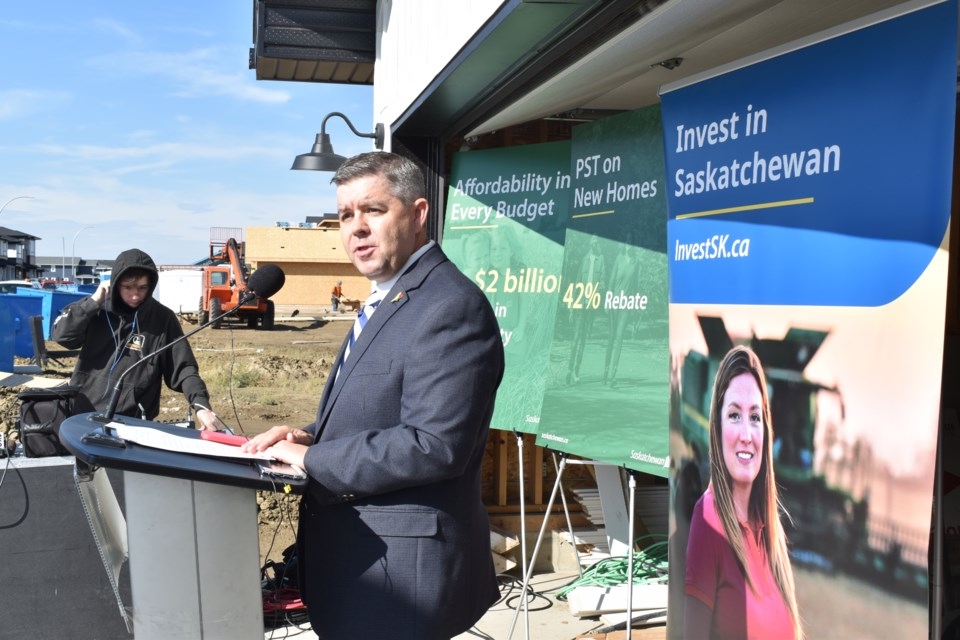SASKATOON — Canada’s immigration program for asylum seekers remains an issue the provincial government wants to continue discussions on with Ottawa, with Minister of Immigration and Career Training Jeremy Harrison pushing the federal government to introduce reforms to prevent further strain on each jurisdiction’s services.
Immigration, Refugees, and Citizenship Canada states that persons can seek asylum in the country if they are at risk of being persecuted or fear for their lives. Those granted asylum receive refugee status and can remain in the country.

The federal government has asked other jurisdictions to help relocate over 200,000 asylum seekers currently being shared by Ontario and Quebec, which need help with the load. However, several provinces, including Saskatchewan, have opposed Ottawa’s move to accept refugees.
“This was entirely predictable that adding … one point some million individuals per year through permanent and temporary streams was going to have an impact on housing, health care costs, education costs, most of which are downloaded to the provinces, by the way, which is why I think the federal government frankly didn’t care a whole lot about what the additional cost was going to be because they didn’t see it as their problem,” said Harrison this week while in Saskatoon.
“So, provinces were raising this issue. And really, we were at the forefront of raising this issue for years because it was entirely predictable that this would happen. But we’re continually improving the opportunities that we have collectively as Canadians.”
Harrison, the longest-serving provincial immigration minister, emphasized the Saskatchewan government’s commitment to this cause. He stated that the province has been making its case for over a decade, consistently raising the issue every time immigration ministers meet in Ottawa. He was appointed to handle the province’s immigration portfolio in 2014, and since then, he has been a steadfast advocate for change.
“We have been very clear with the government of Canada that the conditions that they were creating were deeply problematic. This was eminently predictable: what happened to the number of asylum claimants in the country? I’ve told the federal government that this problem hasn’t just materialized for years,” said Harrison.
“This has been a growing issue. This was an issue they created; they needed to solve it and not solve it on the backs of provinces. To this day, we still have not received a call from the federal government that has made any formal request for resettlement, of which, as the premier [Scott Moe] points out, they have no authority to do that either.”
Moe said the opposition reflects the concerns of the people of these provinces, and the provincial governments are working to ensure that these concerns are heard and addressed.
“It’s not conducive for a federal government to come out and say, ‘well, listen, we’re going to resettle folks,’ which they don’t have the power to do, in your province, without first at least picking up the phone and having that discussion with said province. You’ve seen the reaction from Alberta, you’ve seen the reaction from Saskatchewan, and I suspect that will be mirrored in other areas,” said Moe.
What I’ve said from the beginning is we have a flawed system of assessing who is an asylum seeker and who needs to go back to where they came from. And they [federal government] need to speed up that system and fix some of the flaws in that particular system. And I would say that across the board, we need to look at our immigration system and ensure that it is an immigration system focused on economic immigration. And ensuring, yes, folks that move here have an opportunity for a better life.”
Harrison said he had informed the current Minister of Immigration, Refugees, and Citizenship, Marc Miller, and even his predecessors Sean Fraser, Marco Mendicino, Ahmed Hussen, and John McCallum of the problems with the visa rules.
“We are entirely in favour of lawful and regular immigration. This province has been a significant beneficiary of lawful and regular immigration. We continue to be very strongly supportive of that. We have the strongest program integrity framework in the country, which we’ve worked hard at and copied by several other jurisdictions. The public is supportive of lawful and regular immigration. Though they do not support asylum claims, which may be spurious and not well founded, IRCC finds many of them not well founded. That is not something the public is supportive of. The federal government have created this issue. They have been told that this was an issue they were making that they needed to address, but they chose not to,” said Harrison.
“We’re in this place right now, and it is just not acceptable for the federal government to turn to the provinces and say, fix this problem we created for us. We’re not interested in doing that. There will be a minister’s meeting on Monday [Sept.23]. Still, we have had several meetings at the ministerial level where this has been a topic of discussion, and I’ve made interventions at those meetings that have been very similar to what you just heard me talk about. I’ve been very blunt with federal ministers, given the history and background that I’ve had in the portfolio. They’ve chosen not to take that advice, and it’s not just been Saskatchewan making that case. Other provinces have also made that point pretty clearly, and they’ve chosen not to accept it.”
Harrison said he had repeatedly pointed at the immigration minister’s table controlling the numbers of temporary entries needed and the ability to convert them to permanent status, which had now increased in a way that was not sustainable.
“I mean, my view has always been that we want to convert those here to permanent residents temporarily. That’s how you think in a very successful immigration system. That’s how it works. Temporary residents are converted to permanent and become citizens over the long term. You have to have a plan in order, a transition, and a path for that to happen. And I don’t think that existed. I think the federal government just looked at the levels and said we need to increase the levels to an arbitrary target,” he said.










Comments